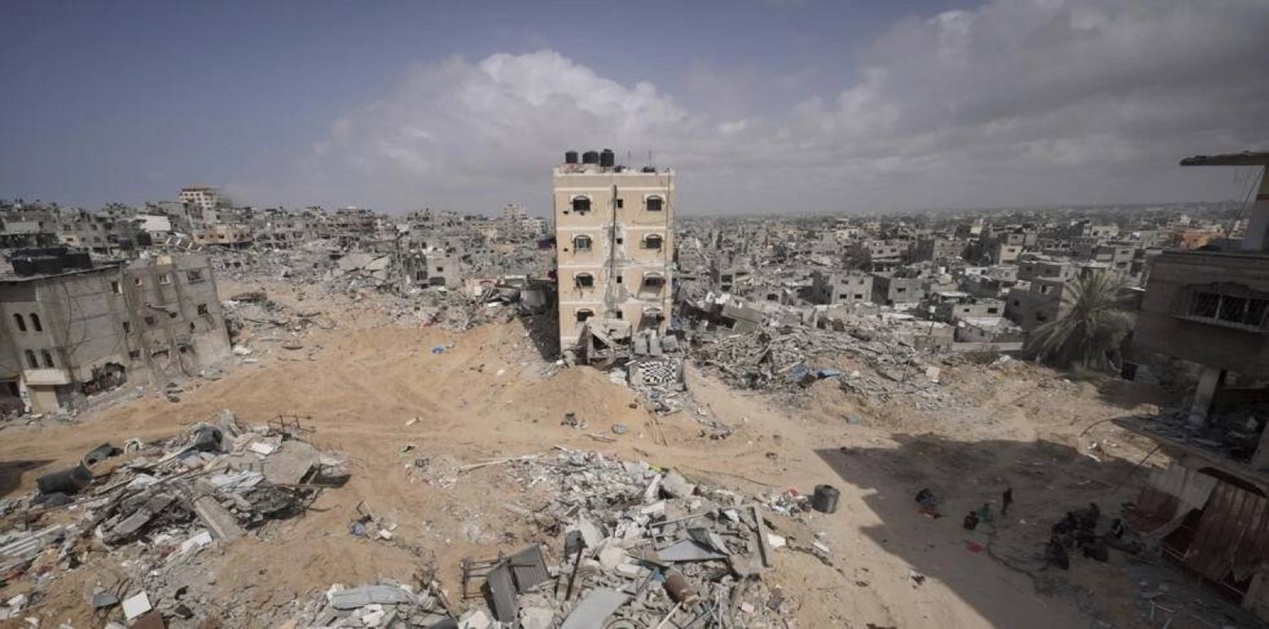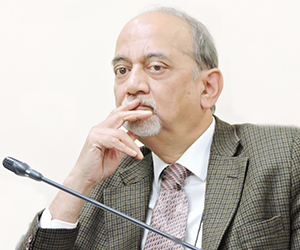The Gaza war has continued beyond seven months. Amidst stepped-up diplomatic efforts, the fate of the hostage deal continues to be uncertain. The US Secretary of State Blinken visited Saudi Arabia and Israel. Israeli forces have entered Rafah. There is a relief that the Israeli-Iranian clash has been contained and a wider conflagration prevented.
Iranian strike against Israel on 13th/14th April was in retaliation against the Israeli bombing of the Iranian Consulate building in Damascus on 1st April in which six senior IRGC Generals were killed. The strike consisted of 300 drones, cruise missiles, and ballistic missiles fired by Iran against Israeli targets. Iran had conveyed prior warnings through Arab states and the US. The action was calculated to demonstrate capacity while minimizing the casualties. Prior notice was to avoid conflict escalation. Iran acted with restraint.
The US and UK took part in defensive action to protect Israel. According to Western media sources, 99% of the incoming drones and missiles were destroyed. However, by all accounts, Iran’s ballistic missiles managed to hit the Nevatim air base in the south, where Israeli F-35 aircraft are based. President Biden asked Prime Minister Netanyahu to take the ‘win’. The advice was given to restrain Israel from retaliation. Biden also made it clear that the US will not be a part of any offensive action by Israel against Iran. The US action was calculated to avoid escalation which may draw the US into war with Iran.
Prime Minister Netanyahu vowed that Israel will retaliate against Iran. There was a statement by IRGC General Haghtalab that any attack on Iranian nuclear facilities and installations would lead to a review of Iranian nuclear doctrine. [1] This was a significant statement. Iran is an NPT signatory. The Supreme Leader has also said that Iran will not use nuclear weapons. The statement by Major General Hagtalab also said that Iran will reciprocate any Israeli strike. Iran also made it clear that this time retaliation would not take days or weeks but would take place in minutes.
The Israeli strike came on the 18th of April. Though Israel as a matter of policy neither accepts nor denies such action, the Israeli media claimed that a missile fired from an Israeli F-35 hit an Iranian S-300 battery near Isfahan. Iran has denied the story and said that there was an attack by three drones, which have been shot down by Iranian air defense.
There have been stories in the Israeli media that Israel’s bombing of Iranian Consulate building on 1st April was decided by Israeli Defense Force (IDF) without consultation with Mossad. The unusual admission suggests that there is some re-thinking about advisability of Israeli strike which led to the present round of exchanges. [2] There could be an alternative explanation of Israeli action. The American media accounts have speculated that Israel’s action in hitting at Iranian target was to provoke an Iranian retaliation in order to suck in USA into war with Iran.
There is some relief that the last round of exchanges between Israel and Iran did not develop into uncontrolled escalation. The two sides must also be assessing each other’s weaknesses or strengths. It is hoped that there will be no repeat. Heightened tensions between Israel and Iran also put pressure on moderate Arab regimes to choose sides. There has been a rapprochement between Iran and Saudi Arabia. The Saudi Kingdom and UAE, both have re-established bilateral diplomatic relations with Iran. The detente between the Saudi Kingdom and Iran has prevented the conflict from reaching to the Gulf region. This is a major reason for the stability of oil prices.
Kamal Kharraji, a former Iranian Foreign Minister and Advisor to the Supreme Leader said on 8th May ‘We have no decision to build a nuclear bomb but should Iran’s existence be threatened, there will be no choice but to change our military doctrine.’ [3] This was followed by a clarification by the Iranian Foreign Ministry spokesman on May 12th that there is no change in Iran’s nuclear doctrine. [4] The spokesman clarified that both the Fatwas of the Supreme Leader about the prohibition of inhuman weapons in Islam.
Gaza
The US, Qatar and Egypt are trying to broker a deal for the release of 33 Israeli hostages in exchange for an unspecified number of Palestinian prisoners during a six-week period when there would be a ceasefire. Hamas is insisting on a temporary truce leading to a permanent ceasefire. The complex negotiations face challenges from both sides. Prime Minister Netanyahu stated on 30th April that Israel will enter Rafah and eliminate Hamas Battalions there ‘with or without’ a deal. [5] The statement was made hours before Blinken was set to arrive in the region. While the negotiations were continuing, Hamas launched a rocket attack on 5th May on Karem Abu Salem crossing killing 3 Israeli soldiers. [6]
Israel wants to secure release of hostages while retaining the option of destroying Hamas. Hamas wants to retain leverage on Israel by going slow on hostage release till there is an agreement on a permanent ceasefire. The conflicting objectives will ensure that the conflict will continue. Different intermediaries have not been able to bridge this gap.
Hamas published the deal for hostage release on 7th May including three phases. [7] PM Netanyahu rejected the deal stating that this was different from what was agreed. From Israeli perspective, the deal published by Hamas slows down the pace of hostage release. [8] Israel has closed down Rafah as well as Karem Abu Salem crossings.
Israel served notice for the evacuation of 100,000 Gazans from Rafah to designated areas as a prelude to invasion. The US has been raising questions about Israel’s planned offensive. This may not be driven simply by Prime Minister Netanyahu’s electoral calculations but may have broader support. An editorial in Jerusalem Post on 7th May argued that the step is needed for a more secure future for Israel and the broader region.
Since then, 300,000 Gazans have fled Rafah as the Israeli military expanded what it calls a targeted operation in Gaza[9] The offensive could be a way of putting pressure on Hamas to reach an agreement on hostage release. Does it have an impact on the Hamas leadership? Hamas leadership seems determined to add cost to Israel’s calculus even if this means prolonging the sufferings of Gazans. The negotiators have already returned from Cairo without a deal on hostage release. It remains an open question if military success could help eliminate Hamas or draw Israel further into the conflict. While Israel has launched an operation in Rafah, Hamas has resurfaced in Gaza earlier vacated by Israeli troops. [10]
Biden Administration has announced it has withheld some of the military aid, including 2,000-pound bombs from Israel. As protests continue on US University campuses, political costs mount for the Biden Administration. Israel has already incurred heavy political costs as its differences with its most important ally, America, sharpen. Israel suffered a setback on the diplomatic front with an announcement by Egypt that it is joining the South African plaint in the International Court of Justice alleging Israeli genocide in Gaza. [11] The war in Gaza has no military solution. It needs a political settlement. Hostage release and cease-fire are the immediate requirements. In the long term, there is no alternative to a two-state solution. Iran has to be integrated in the international mainstream with revival of JCPOA and lifting of sanctions.
Endnotes
[1] Reuters, Iranian commander says Tehran could review its ‘nuclear doctrine’ amid Israeli threats, April 18, 2024
[2] Jerusalem Post, Iranian missile barrage: Was it an IDF intel failure masked by air-defense success - analysis, April 16, 2024
[3] Al Jazeera, Iran warns it will change nuclear doctrine if its existence threatened, May 9, 2024.
[4] Tehran Times, No Change in Iran’s Nuclear Doctrine, Foreign Office, May 13, 2024
[5] The Guardian, Netanyahu vows to raid Rafah with or without hostage deal, 30th April, 2024
[6] Al Jazeera, Israel Closes Karem Abu Salem crossing After Hamas rocket Attack, 5th May, 2024
[7] Al Jazeera, Text of the Gaza ceasefire proposal approved by Hamas, 6th May, 2024
[8] Jerusalem Post, Hamas hostage deal ‘Far from meeting our requirements’ - Netanyahu says, May 7, 2024
[9] The Wall Street Journal, In Rafah Israel Reaches for a Knockout Punch that has proved elusive, 12th May 2024
[10] The Wall Street Journal, In Rafah Israel, Reaches for a Knockout Punch that has proved elusive, 12th May 2024
[11] Al Jazeera, Egypt says it will join South Africa’s genocide case against Israel at ICJ, May 12, 2024
(The paper is the author’s individual scholastic articulation. The author certifies that the article/paper is original in content, unpublished and it has not been submitted for publication/web upload elsewhere, and that the facts and figures quoted are duly referenced, as needed, and are believed to be correct). (The paper does not necessarily represent the organisational stance... More >>
Image Source: https://static.srpcdigital.com/styles/1037xauto/public/2024-03/564204_0.jpeg











Post new comment